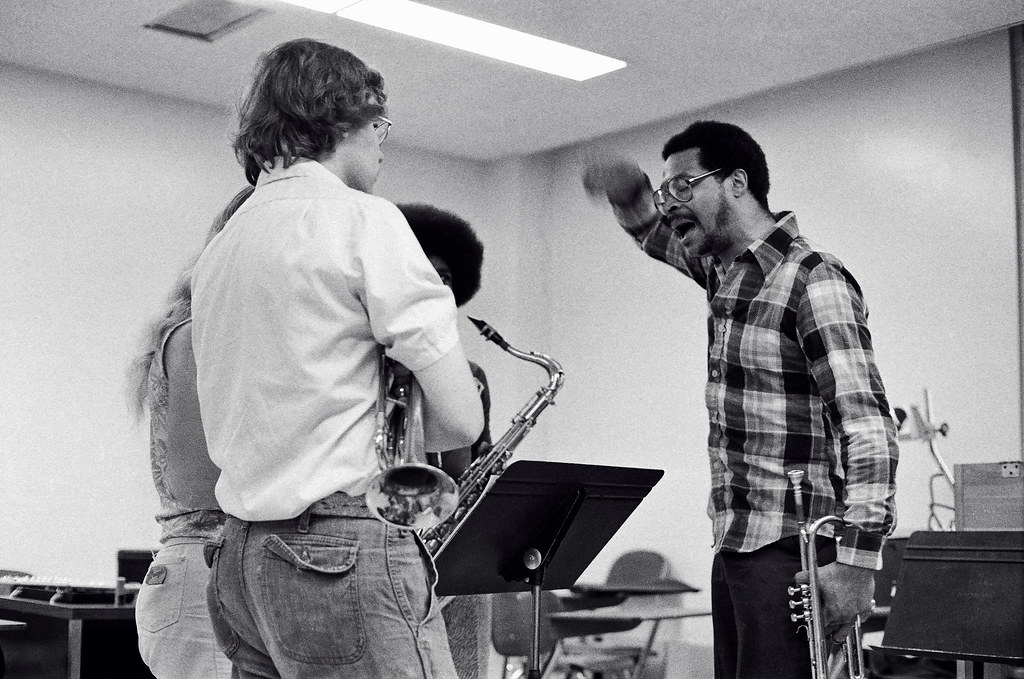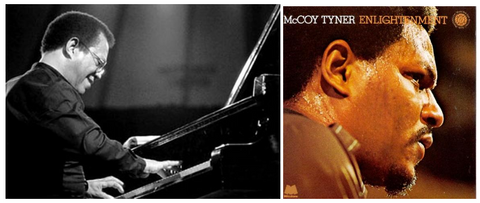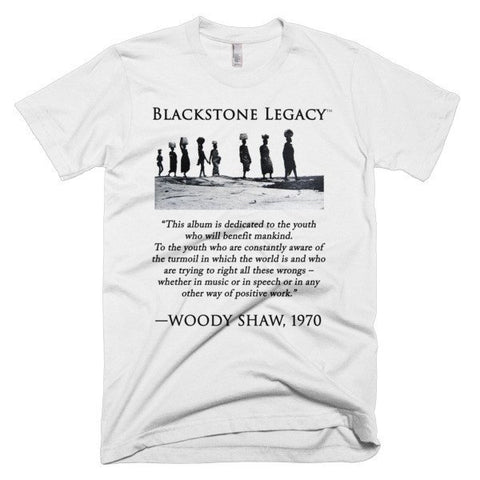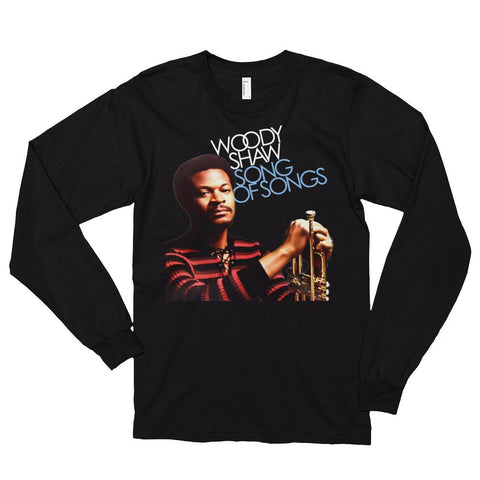Woody Shaw Interview: "My Approach to Jazz" (1976)

In order for me to be consistent as a trumpet player, I try to practice every day, for at least two or three hours. Oh, I’ve been in certain grooves when I said: “Well, I don’t need to practice”, and I rely on certain professional tricks, that I can get by with. But my creative mind tells me that getting by isn’t enough. So I do my chromatic scales and the little exercises. Then I have some symmetrical exercises of my own that I’ve developed. I‘m hoping to write a fundamental book on some of the exercises that I use to attain the concept that I have. A lot of trumpet players have been asking me to put out a book; so I'm working on it.
Definitely, every register is important. As for when they get hung up with the upper register—that turns me off. Because the beauty of the trumpet is in the middle and lower register, you know; I use the high register for excitement, and for effect.
For fingering, the difficulty is in middle register, from middle C on down—that’s why they play so high! I’m going to see if I can have a trumpet designed where I can go even an octave lower than the concert E that it goes to right now. I hear something else; to do what I want to do, the conventional trumpet is not enough now. I need another register—where am I going to get it from? I think it’ll have a fourth valve; I’ve seen a German flugelhorn like that—it goes down to four octaves.
 Woody Shaw teaching at SUNY Brockport, NY. 1978-79. Photo by Tom Marcello.
Woody Shaw teaching at SUNY Brockport, NY. 1978-79. Photo by Tom Marcello.
I have played the flugelhorn at times, but I like the trumpet. The flugelhorn is purely incidental to me; it’s effective and pretty in certain things—but I can get just about the same sound on the trumpet. I have a very well–developed low register, with a very big, dark sound; so I don’t worry about the flugel. But—I’m going to get a flugelhorn ! Now, that instrument fits Art Farmer perfectly; you could have no better choice to play the flugel. It fits his style, his whole musical personality—he’s a very lyrical player. I heard him recently; he sounds beautiful.
Talking of trumpet players like Art Farmer—it’s so refreshing to hear him. I mean, I don’t want to hear Freddie Hubbard play rock, man, but that’s what he’s doing—he’s too good a player for that. But I heard Benny Bailey not long ago—he just knocked me out. Where are all the good improvisers that I grew up on? I look around, and it seems like I’m the only one out here. I still get an occasional chance to hear Blue Mitchell. But I don’t hear any young guys that impress me at all. I was twenty when I was with Horace, and it took me a while to get where 1 am—I’m thirty–one now. You always look for a young demon on the horizon—I haven’t heard him yet.
I think I can claim to have one of the newest approaches on the trumpet. I know some very good trumpet players out there, but they’re just not playing what I want to hear. It’s something that comes with a lot of study and practice. See, to be a good improviser, you’ve got to know about music, to know what you’re doing.
You have to know a certain amount about the keyboard harmony, and playing in all the keys. I think that’s another point, why all the free musicians shy away from learning bebop things—it goes through all the keys. And to play all the keys is very difficult——to get your technique in D flat equal to your technique in C, D equal to E flat, and so on.
By no means is jazz dead—that’s essentially why Louis Hayes and I formed this band. We really enjoy playing. Ronnie Scott’s is a nice club, but the only drag about playing there is that we only have forty–five minutes for each set. We’re used to playing an hour, or an hour–and–a–half—maybe even two hours. So we’re getting our show–time technique together.
AUDIO CLIP: Louis Hayes—Woody Shaw Quintet : "Bilad As Sudan" (Land of the Blacks by Rene McLean) (1977)
You do a record date, you have to take shorter solos—I think of this gig like a record date. We did pretty good towards the end of our engagement last August: we were getting in three tunes per set. If it became a little more expressive, we went back to two again. Which is all right; if we can get two good tunes into a forty–five minute set, I don’t think anything’s lost.
The thing I like about New York: I can go all over town, and hear some good music. When I used to be in San Francisco, guys would say: “Ah, nothing’s happening in New York.” I said : “Nothing? I can’t believe that.” I came back, and sure enough, it was happening. Jazz went through its little down trend, but it’s better now.
For one thing, I blame the musicians for nearly killing the music. I mean, some of the rubbish that they call jazz in the States is not jazz.
George Wein puts on what he calls the Cool Jazz Festival—with Harold Melvin and the Blue Notes, Aretha Franklin, Gladys Knight and the Pips, Ramsey Lewis. That’s not jazz! We were thinking about suing this cat for degrading the name of jazz! And we had a whole nest of noisemakers misusing the word also. We said : “Wait a minute—we gotta change this a little bit !” It was time for us to get together. We used to watch Cedar Walton’s band, with George Coleman, Sam Jones and Billy Higgins: they seemed so happy up there when they were playing—and they work all the time. They stay busy. We said: “They’ve got a quartet. Let’s get a dynamite quintet, with trumpet and tenor.” Well, I was complaining before because I wasn’t working that much: I’m complaining because I’m working too much now.
People who’ve never even heard jazz can really enjoy it, if they’re given a chance to. The presentation of it is very important. There are a few of us; I can name Cedar’s band, McCoy Tyner. the Heath brothers. Art Blakey.


Horace Silver, Bobby Hutcherson—he’s still playing. I learned a lot from him when I was in school. We’re the ones out here who still believe in the music.
Mentioning McCoy reminds me: I used to play with him, and he was a very strong influence on me. He used to tell me: “Woody, you’re going to be the next great trumpet player out here. Just keep going straight ahead. Do what you have to do, and believe in the music.”
I watched him, and now the same things are happening for me. This was a few years ago when he said this; I was with him in the late ‘sixties. I talked to him again recently; he said: “Hey—I told you.” Now, I’m just starting to gain some of the rewards of playing the music, I think. That reward is to just let me play—make a decent living, and be happy. I really don’t think a creative musician belongs with a lot of money—it stunts his growth. They do deserve their full rewards for their contribution. But a musician—once he starts earning a lot of money, man, his music gets corny; I don’t see why that has to be the case, but it usually is. Some kind of line has to be drawn, that’s all.
Mind you, now—I want as much as I can get! But I really can’t complain. Specially when I remember that around two years ago I was sitting depressed in San Francisco. Nobody seemed to be paying me any attention; I couldn’t get a decent gig anywhere. I even started considering : “Man, I can’t even play this thing any more.” I felt in myself that I wasn’t playing anything. I changed my environment and now the ideas are just brimming over in my brain. I think environment has a lot to do with it. Me, I’m from the city—that stimulates me.
This group is going to stay together, keeping working and making records. We have one out on Wim Wicks’ Timeless label, which is based in Holland. And I myself have exclusively signed with Muse Records. When my record “The Moontrane,” came out in ‘75, it was pretty controversial—I think because they were surprised that somebody came out with a hard, smashing, swinging jazz record. I believe I kinda restored the faith in a few people, with that; I got a lot of very nice reviews on it. I have a more recent one that had the same effect; it’s called “Love Dance”. Now, I’m finally starting to record some personal ideas that I want to put down; I’m going to show different aspects of my playing. One of these ideas is a brass record date, with three trumpets, four trombones, one reed and a rhythm section—maybe some miscellaneous things here and there. I’m very wrapped up in writing something for brass.
I stay fresh by doing different things —now that I’m finallv getting a chance to record my own material—I made a lot of records as a sideman, and I used to ask myself: “How come I can’t get a record date?” I know now—it wasn’t time. Very simple. To my record now I have four albums out: “Blackstone Legacy” is a double record set on the Contemporary label; I have another one called “Song Of Songs”, which is out of print right now, also on Contemporary, and the two Muse records. So I hope to be recording some interesting things.


Something else I must mention is that we have very good management. Maxine [Gordon] is doing a very good job; she really loves the music—we need more people like her in the business. She knows what the musicians go through, what we have to do to get where we are. I think if we had some more sympathetic management out here, you would see a lot more groups.

Photo by Tom Marcello.
The beautiful thing about this group is : everywhere we go, they love us. The worst gig we did was in Italy; we played on this concert that had a lot of the free music on it. Before we went on, Sam Rivers had the people in an uproar, really roused; he plays the flute for a minute, goes into his whooping and hollering sounds with his voice, sits at the piano and bangs on that for a while, then runs over and grabs the saxophone—a frenzy of activity. The people were banging chairs and everything. When we played, we had a completely calming effect on them; we turned them right back into conservatives. So that was an experience. I mean, we go out there, too, sometimes—but we know how to get back, though. I’ve got my feet on the ground—or at least I’ve got my parachute on!
" I‘m hoping to write a fundamental book on some of the exercises that I use to attain the concept that I have. A lot of trumpet players have been asking me to put out a book; so I’m working on it." i wish we had that book…would love to buy it..
Wonderful words with Woody. I remember hearing Blackstone Legacy, and all my friends thought it was THE hippest stuff we’d heard, so much openness while still in a deep, tight groove. Funny that Woody doesn’t hype that record here-just a mention. Way ahead of its time, indeed. I wonder what he’d be doing now?
Love me some Woody!